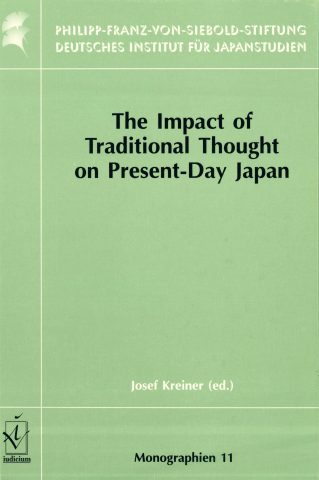
Einzelheiten
1996, ISBN 3-89129-491-3, € 45,—, iudicium Verlag, München, 236 S., geb. [Bestellen]Autoren
Kreiner, Josef
The Impact of Traditional Thought on Present-Day Japan

This volume deals with interdisciplinary research on the cultural and ideological causes for – and reasons behind – economic growth in East and Southeastern Asia, especially in Japan. The contributions discuss the assumption that – similar to European industrialization and modernization where, according to Max Weber, the inner wordly ethos of Protestantism was the decisive factor – there must have been a comparable spiritual basis underlying the successful modernisation of Japan and some other countries in East and Southeastern Asia. Contents: Confucianism, Economic Growthand Social Development • The Confucian Dimension in the East Asian Development Model • Confucianism and Modernization in East Asia: Theoretical Explorations.
Inhalt
Kreiner, Josef
Introduction
Introduction
Kubo Noritada
Taoist influence on modern Japan
pp. 185-208
Taoist influence on modern Japan
pp. 185-208
Frank, Ronald
Traditional legal thought and present-day law
pp. 209-233
Traditional legal thought and present-day law
pp. 209-233
Tu Wei-ming
The confucian dimension in the East Asian development model
pp. 31-48
The confucian dimension in the East Asian development model
pp. 31-48
Kim Kyong-Dong
Confucianism and modernization in East Asia: Theoretical explorations
pp. 49-69
Confucianism and modernization in East Asia: Theoretical explorations
pp. 49-69
Dumoulin, Heinrich
Tradition and modernity in Japanese buddhism today
pp. 71-84
Tradition and modernity in Japanese buddhism today
pp. 71-84
Schepers, Gerhard
Shinran's thought in present-day Japan
pp. 85-107
Shinran's thought in present-day Japan
pp. 85-107
Ōbayashi, Taryō
Shintō and buddhism in Japan
pp. 109-131
Shintō and buddhism in Japan
pp. 109-131
Ashkenazi, Michael
Some influences of Shintō on Japanese business practices
pp. 133-149
Some influences of Shintō on Japanese business practices
pp. 133-149
Senda Minoru
Taoist roots in Japanese culture
pp. 151-156
Taoist roots in Japanese culture
pp. 151-156
Gebhardt, Lisette
The peachblossom utopia: Taoist thought in modern Japanese literature
pp. 157-183
The peachblossom utopia: Taoist thought in modern Japanese literature
pp. 157-183
Dore, Ronald
Confucianism, economic growth and social development
pp. 17-30
Confucianism, economic growth and social development
pp. 17-30